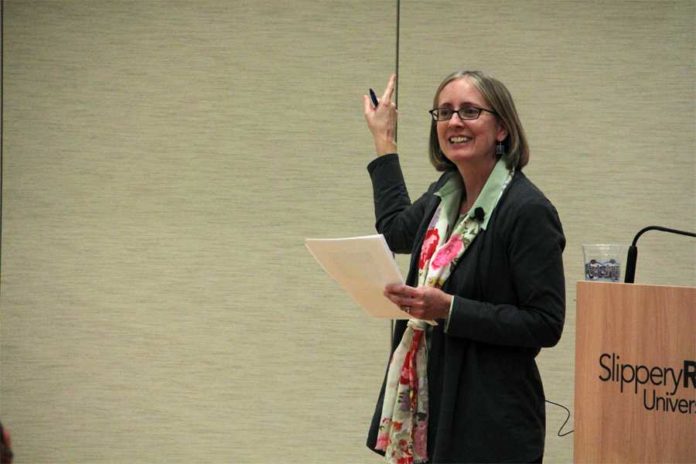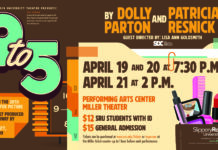In celebration of SRU’s 125th anniversary, the President’s Commission on the Status of Women hosted the nation’s foremost expert on the history of higher education on Tuesday night, to discuss the country’s earliest Normal Schools.
Normal schools developed as the earliest means by which women were able to attend school to get an education. These institutions established classroom standards, or “norms”, for how teachers should educate and what students should be taught.
Also sponsored by the Women’s Studies Program, the Women’s Center, College of Education, and the history department, the event fittingly took place during not one, but two celebrations, as March is Women’s History Month. A reception was held for esteemed speaker Dr. Chris Ogren, by the night’s sponsors and was attended by a select group of students and faculty members, including Dr. Cindy LaCom, who was instrumental in organizing the event.
LaCom, who works as a professor in the English department, and is a member of the President’s Commission, collaborated with her committee members to find a speaker that would tie together gender issues and education in a way that would highlight the university’s history.
“Many normal schools developed into colleges and universities, and Slippery Rock is one of them,” said LaCom. “It seems appropriate because it’s our 125th anniversary, and Women’s History Month, for Chris to come here to speak.”
History, gender, and education are treated as separate and distinct issues that can’t be understood without examining their historical context, according to LaCom.
“Normal schools gave women the opportunity to be salary earners and to be independent,” LaCom said. “We still live in a world where education is dominated by women, and each of these issues ties together.”
Dr. Nicole Hahna, an assistant professor in the music department, attended the reception for Ogren, and was eager to hear her lecture on her research regarding women and education. As a member of the President’s Commission with LaCom, having the nation’s expert on Normal Schools speak at SRU seemed like a perfect fit.
“I’m interested in hearing how women’s roles have changed in the history of education,” Hahna said. “It’s neat to think that Slippery Rock now has its first woman president in its 125 year history.”
Finally, time came to hear Ogren speak as guests gathered in the Smith Student Center Ballroom as she lectured on her book, “The American State Normal School”, and the issues encompassing these early institutions including perceptions and prestige.
The women that attended normal schools at the time of their inception often came from underprivileged backgrounds, as many were the daughters of farmers. A number of the women enrolled in these schools were also “nontraditional students” that were already teaching, but had later decided to get an education. Being able to use telephones, pianos, and indoor plumbing exposed them to the middle-class life, which they were not accustomed to.
“Historians have often sold short normal schools,” Ogren said. “Towns would also go so far as to bury their history. I’m happy to see that Slippery Rock hasn’t buried its history as a normal school.”
These institutions had low prestige, and the women attending them were being trained for a low status position in society, according to Ogren. Today, status and prestige still impact how teachers are viewed in society.
In spite of what was said about normal schools, these women worked hard and wanted to expand their horizons beyond education to learn about culture. Literary societies were established and institutions like Slippery Rock held lectures in the early 1890s, in order to give these women more opportunities. Many of these schools also began to offer liberal arts classes, in addition to subjects like Astronomy and Zoology, to further their students’ learning.
“Women dissected animals and gathered their own specimen even though it wasn’t considered proper,” Ogren said. “This marked the demand for a higher degree in culture as well.”
Normal schools gave women opportunities and financial independence over the course of their history, and are continuing to do so today, now as colleges and universities, a prime example being SRU.








